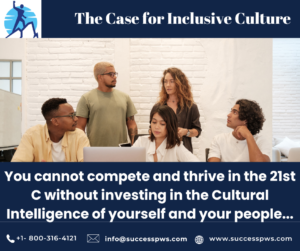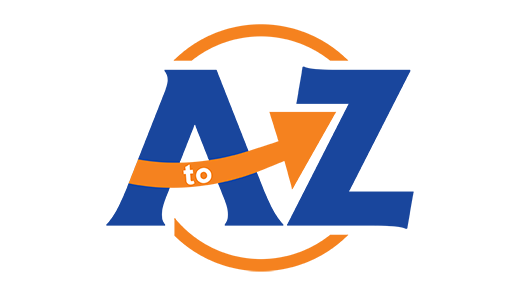01 Jun The Strong Case for an Inclusive Culture
How to increase the cultural intelligence of your people and tap into their unlimited individual and collective potential
Someone once said that in the past they used to hire and promote people with high IQ and fire them for the lack of EQ (Emotional Intelligence). Now, they hire and promote them for high EQ and fire them for the lack of CQ (Cultural Intelligence).
Regardless of your off-chart abilities, qualifications, skills (because of your IQ), and smartness (due to your high EQ), you will find yourself very vulnerable if you lack the cultural intelligence needed to succeed in the industry you operate in and the society you live in.
As much as CQ is critical for individual success, so is it also crucial for corporate success. It is unlikely to create an inclusive culture without taking your individual and corporate cultural intelligence seriously. In short, you cannot compete and thrive in the 21st C without investing in the CQ of yourself and your people.
Why should you take it seriously?
Why should you bother? Why should you go to all the trouble to increase the cultural intelligence of your people? Why rock the boat? What is the ROI?
1. The world demands it
The world is different. It embraced diversity quicker than many individuals, teams, and organizations. Now, they’re demanding it. Your society, global, regional, national, and local regulatory bodies, watchdogs, and institutions- directly or indirectly, would like to see you adopt DEI (Diversity, Equity, and Inclusion) to get their approval, funding, partnership, and support.
2. The world expects to see itself represented in you
The world has changed so you too must change. The world has become diverse. It is almost unlikely to work and do business with a predictable monogenous group any longer and at the same time expect sustainable success. You need diverse clients and strategic partners. However, these stakeholders, consciously or unconsciously, would like to see themselves represented in your team/organization. At least, they expect you to acknowledge and respect their differences as you work with and deal with these diverse stakeholders.
3. Creativity and performance increase with it
Statistics show that those who achieved true diversity are outearning those who failed to do so by one-third. Unlike homogeneous groups of people who think, expect, behave, decide, and act the same and predictably, diverse people have differing views, perspectives, and have fewer blind spots as they make decisions and act creatively.
What does this all mean to you? If you or your team or organization desires to be current, garner the support of others, and continually innovate and perform, you don’t have any choice except to create and nurture an inclusive culture that allows your people to manifest their true selves, feel embraced, part of the family, and ultimately tap into their individual and corporate potential.
But mere diversity- bringing different people to the table and creating a diverse team is the start of a long and protracted journey.
Having the representation and the know-how about the cultural identities of the people you work and do business with is a mere prerequisite if your desire is to tap into the full potential of your people and maximize every meaningful relationship you have with the outside world. Nonetheless, if you would like to get the ROI of your DEI efforts, the key is mixing them well to create an equitable and inclusive culture…
Why should you listen to me?
Why should you care about what I’m saying? What makes me the right person to talk about this theme?
I’ve crossed diverse organizational and societal cultures. I studied cultures for over a decade. I’ve been also speaking and providing training on the subject matter for many years. It is one of my favorite topics.
That means I have both the theoretical and practical exposures to help you take your cultural intelligence to the next level, and by doing so tap into the individual and collective potential of your people.
Diverse societal cultures
 I was born and raised in Ethiopia, which is on the horn of Africa. My hometown is Harar, which is so diverse that Christians and Muslims, and people from different ethnic backgrounds lived together in harmony for centuries.
I was born and raised in Ethiopia, which is on the horn of Africa. My hometown is Harar, which is so diverse that Christians and Muslims, and people from different ethnic backgrounds lived together in harmony for centuries.
The first culture shock I experienced was when I moved to the capital city of Ethiopia, Addis Ababa. Though within the same national culture, crossing a subculture wasn’t easy.
I also traveled to some African countries such as Côte d’Ivoire, Ghana, and Botswana when I was the President of the Addis Ababa University Students’ Union in the late 90s. Though within the same communal culture, the national cultures of these nations were different.
The biggest cultural shock I experienced was when I moved to the US in 2005. If the cultural shock I experienced while moving from my hometown to the capital city was 2 Richter scale, and traveling in some African countries was 5 Richter scale, the cultural shock when I crossed from a communal culture to individual culture was over 8 Richter scale😊
Every time I crossed a culture, I felt anxiety, frustration, and uneasiness. In some cases, I was angry and resentful. Back then, I didn’t have cultural intelligence. I thought the culture where I grew up was the flagship culture. I was expecting everybody in the world to communicate, interact, behave, and act the way we did in my own native culture.
Now, I know better. I realized that no one single culture is the standard bearer. All cultures have benefited their inhabitants and have been working for them.
After so much stumbling, frustration, and learning, now, I have better cultural intelligence. I’m now humbled. My job isn’t to criticize and judge people from other cultures. Rather, enjoy every interaction to learn more about other cultures while enjoying diversity, which makes life on earth beautiful and devoid of boredom.
Diverse organizational cultures
I’ve diverse professional backgrounds: Science, Medicine, IT, and Leadership. I have had different titles: Researcher, software engineer, author, coach, copywriter, and trainer. More to come…
I also served organizations from diverse corporate cultures such as Technology, IT, Manufacturing, Learning, Leadership, Non-profit, and Spiritual.
These different corporate cultures have some similarities and differences. Every time I moved from one organizational culture to the next, I made some smooth and some that weren’t so pretty moves. I’ve had some rough transitions because of the cultural differences that manifest in organizations in different industries.
1-Day workshop
Last Thursday I co-facilitated a DEI workshop in Bethesda, MD.
Participants gained a thorough understanding toward:
- Major cultural divides in the world,
- Importance of Cultural Intelligence,
- How to increase their cultural intelligence,
- And many more insights, models, and approaches that they can apply right away to take their and their teams/organization’s cultural intelligence to the next level to further achieve DEI.
Let me give you a couple of simple and easy tips to take your cultural intelligence to the next level very quickly:
1. Blind spots. The moment one thinks doesn’t have a blind spot, that is when the person should worry that they may have lots of blind spots. We all have blind spots that may come in the way preventing us from getting along with people with diverse cultural identities. Yes, we may know the ‘ins and outs’ of our native culture. We may predict and live in harmony with people in the in-group. We should always have this in the back of our minds: I might have some blind spots concerning some cultures, even the ones I have lived and visited.
2. Seeking feedback. To uncover your blind spots and increase your cultural intelligence, seek feedback continuously. Don’t assume you know everything about an individual who may even be the same as you in some aspects of your cultural identity. For instance, you could be of the same gender or from the same country. There are subcultures within a national or organizational culture. There are also individual exceptions. Ask simple questions and assess where you are on the cultural intelligence spectrum: “How am I doing as I interact and work with you? What is working and what is getting in the way? What are some of the things that I’m saying or not saying, doing or not doing that are causing some discomfort and unease?”
3. Giving feedback. Don’t assume that the people who struggle to communicate and get along with you are saying and doing things intentionally. They may say and do things out of good intentions and goodwill. They may never know what they’re doing wrong and how it may negatively impact others, of course, unless you tell them. You’re a change agent. You don’t want this person to live with their blind spots and continue to wreak havoc. You don’t want this person to hurt others day in and day out. You shouldn’t allow this person to undermine your efforts to create and nurture an inclusive culture. However, you must excel in providing feedback that delivers results. The feedback that achieves your intentions and goals- Creating an inclusive culture.
I hope this short article has given you some tips on how to increase your and your people’s cultural intelligence. The suggestions above don’t cost you anything and aren’t rocket science.
You should practice them starting today, if you haven’t yet, to see a major difference in your own and your people’s cultural intelligence. If you keep improving your mindset and skillset one at a time, you ultimately master creating and nurturing an inclusive culture, and in turn, tap into the individual and collective potential of your people.
Note: If there is anything we can do to help you fine-tune your processes, systems, and train your team to create and nurture an inclusive culture, reach out via [email protected]
